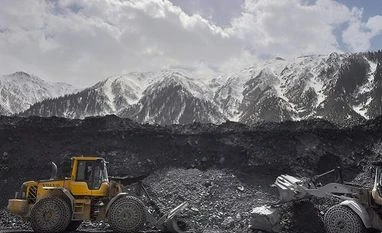The work on the strategic Zojila tunnel an all-weather connection between the Kashmir valley and the Ladakh region -- is going on at a rapid pace and over 40 per cent of the drilling has been completed, the construction company said on Sunday.
The company said it is hopeful of completing the project by December 2026.
The tunnel project through the mighty Zojila Pass at an altitude of 11,578 feet on the Srinagar-Kargil-Leh National highway is of strategic importance as the highway remains closed during winters due to heavy snowfall, cutting off Ladakh region from Kashmir.
The single-tube Zojila tunnel from Baltal, in the Ganderbal district of central Kashmir, to Minimarg, in Drass town of Kargil district of Ladakh, is 13 km long with an approach road of 18 km.
"This project is a huge game changer by the government of India. The total length of the project from Sonamarg to Minimarg is 31 km. From Sonamarg to Baltal, it is 18 km, and then the main tunnel from Baltal to Minimarg which is 13 km long. The work is going on at a rapid pace on both the projects, Project Head, Megha Engineering and Infrastructure Limited Harpal Singh told PTI here.
MEIL is constructing the tunnel.
More From This Section
Singh said the work had to be stopped for two months in the winter because of back-to-back avalanches in January in which two persons were killed.
About 38 pieces of equipment of the construction company were buried under the snow which have not yet been retrieved.
"It was a temporary setback," Singh said, adding, I am hopeful that the whole project will be completed by December 2026.
Singh said out of the 13 km long tunnel, a total of 6 km cutting has been done three km from this side and the rest from the other end. "The remaining work will be completed in time, he said.
The project head said the company is using a modern method of tunnelling which is known as new Austrian tunnelling method.
By this method, we have achieved three important things -- the safety of the tunnel, the safety of the work-force, and the speed, he added.
By using this method, he said, the chances of accidents are very low and the quality and the speed of tunnelling are very good. This is a special technology applied in Europe and North America, he said.
Out of the total 31 km project from Z-Morh tunnel in Sonamarg, to Baltal, the approach road is 18 km and the work is also going on their simultaneously.
About 60 per cent of work has been completed on this. There are four bridges on which about 80 per cent of the work has been completed. There is five-km Nilgarh tunnels which have been completed. The work is going on at an advance pace and the approach road would be operational within two years, Singh said.
He said people will not face any difficulty in coming to Baltal even in winter when there is heavy snowfall because of the approach road to the tunnel.
Asked about the importance of the tunnel with respect to the Defence forces, Singh said after the completion of the tunnel, the forces will be able to move across round the clock.
The road remains closed for four months due to snowfall. It is a very long time. There are so many defence forces personnel, we have a border with China which has a strong military. It is risky for our forces to face such a huge army when there is no land connection with the rest of India.
After this tunnel is constructed, the Indian defence forces will move uninterrupted throughout the year. People of J-K and Ladakh can move throughout the year. It will be a huge advantage. What we had not been able to do in the last 75 years, you will have it in the next three to four years, he said.
He said not only will it shorten the distance, the time taken will also be very less. This distance will be covered in less than 40 minutes instead of four hours, he said.
Site-incharge of MEIL, Sanjay Sharma, said the tunnel would be the longest in Asia at the highest altitude. He said there were many challenges working in the young Himalayan range.
"But, the main challenge is outside the tunnel. It is the weather. First two years, we worked in winter months also. But, last year, we had to stop for two months due to avalanches, he said.
Parliamentary consultative committee on Road Transport & Highways, led by Union Minister Nitin Gadkari, is visiting the project site on Monday.
)